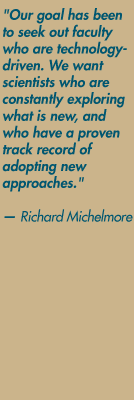Richard Michelmore has a plan for harvesting new
cancer knowledge
Richard Michelmore, professor of genetics in the UC Davis College
of Agricultural and Environmental Sciences, is passionate about diseases of plants. Why does a pathogen
attack one plant and not another? How does genetic resistance against a pathogen change over time? And
how can answers to such questions be used to improve crop resistance to disease?
As director of the Genome Center
on the main UC Davis campus, Michelmore will bring
that passion to bear on a spectrum of scientific investigations — cancer prominently among them.
"Understanding the consequences of genetic variation is a central challenge throughout biology," he says.
"It cuts across all disciplines."
Internationally renowned in plant genomics, Michelmore's own research focuses on genetic mapping and
gene function in lettuce, tomatoes and aridopsis, a model plant related to mustard. Educated at the University
of Cambridge in England, he has been with UC Davis since 1982.
Michelmore has a strong interest in translational research, in which basic scientific information is
translated into new approaches to society's needs. He'll foster the same translational focus within the
Genome Center, whether it's
creating a more virus-resistant plant or strengthening the body's ability to repair mutations leading
to cancer.
To Michelmore's mind, basic and translational research go hand in hand. That approach has helped to make
the UC Davis College of Agriculture one of the
best agriculture schools in the world: Scientists and farmers work closely together, new ideas germinate,
and research stays relevant.
He anticipates similar collaboration among basic researchers at the Genome
Center and scientists and physicians at the Cancer
Center, resulting in unique opportunities to address important questions and needs in clinical oncology.
The Genome Center will be part
of the six-floor, 225,000-square-foot Genome
Biomedical Sciences Facility on the main campus. The new building will house an unparalleled array
of genomics, proteomics, transcriptomics and metabolomics research facilities.
"The whole facility is designed in the hopes that sparks will fly as researchers bounce ideas off each
other," says Ken Burtis, professor of genetics and an associate director of the Genome
Center. An expert on DNA repair mechanisms in fruit flies, he was a participant in the sequencing
and annotation of the fruit fly genome.
Scientists throughout the university and medical center will be able to use the resources of the Genome
Center through a system of "technological cores."
Michelmore and Burtis both understand the potential for expensive, wasted efforts when scientists work
independently to develop and apply new technologies, without knowledge of one another's efforts.
"There's a lot of reinventing the wheel," Michelmore notes. "Our aim is to have an institutional, rather
than a lab-by-lab, learning curve," he says.
"Our goal has been to seek out faculty who are technology-driven," Michelmore says. "We want
scientists who are constantly exploring what is new, and who have a proven track record of adopting new
approaches."
Two of the first scientists hired for the Genome
Center have a strong interest in cancer-related research. Michael Wright, from the Institute of Systems
Biology in Seattle, uses a mass spectrometry-based proteomics approach to understand androgen-receptor
function in prostate cancer cells.
Androgen-receptor function is one of the most important puzzles in prostate cancer research today, and
a major focus of inquiry at UC Davis Cancer Center. If scientists can determine how some prostate cancer
cells develop androgen independence, the knowledge may help to prevent or reverse the process, an advance
that would extend the lives of thousands of men.
Peggy Farnham, who recently arrived from the University of Wisconsin, has developed a powerful method
that allows her to identify where transcription factors bind to the genome, a crucial step in cell division.
The new Genome Center recruits
will join the 240-member UC Davis Integrated Cancer Research Program, a multidisciplinary team of scientists
from the medical center, Davis campus and Lawrence Livermore
National Laboratory in Livermore.
Michelmore predicts genomics research will generate technological change on a scale comparable to the
Industrial Revolution or computer age, and that UC Davis will play an instrumental role in ushering in
the 'omics era.



